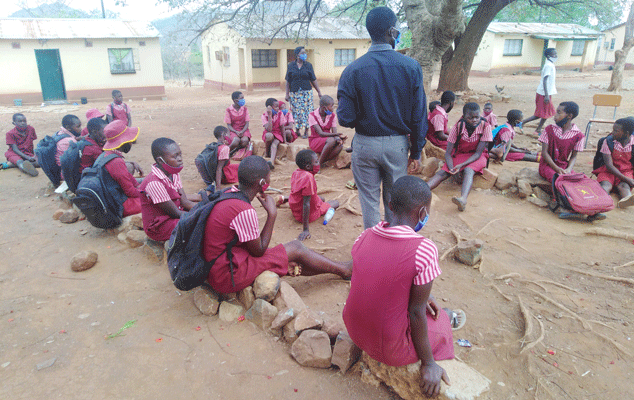
Runyararo Zhou from Kajakata village wears her handcrafted face mask as she sits under the shade of trees with fellow Grade 7 peers at Bushu Primary School in Shamva district’s ward 13.
social commentary:with Moses Mugugunyeki
She is among a handful of pupils coming to school preparing to write their final primary school examination.
With her peers, they are physically apart, but she said she was missing her favourite game, nhodo.
After learning on the dangers brought about by the Covid-19 pandemic, Zhou has stopped playing nhodo and other games that bring her into close contact with her peers.
However, she said the situation is different at home.
“Normally, we put on masks when we get to the school gate,” Zhou told Standard Style.
“At home we don’t wear masks and no one observes social distancing.”
- Chamisa under fire over US$120K donation
- Mavhunga puts DeMbare into Chibuku quarterfinals
- Pension funds bet on Cabora Bassa oilfields
- Councils defy govt fire tender directive
Keep Reading
She got to know more about social distancing and other measures to tame Covid-19 transmissions when schools opened for Grade 7 classes four weeks ago.
Shamva district is among a number of communities that have had sporadic cases at the height of the Covid-19 outbreak.
It is against this background that the community is reluctant to implement Covid-19 prevention and control measures.
Education authorities in the area believe as schools open for the last batch of pupils, it’s not time to sit on the laurels, but to consider public health measures in the context of Covid-19.
“We believe the reopening of the rest of classes on Monday [tomorrow] brings about a number of challenges in implementing the Covid-19 prevention and control measures,” said Captain Motsi, chaplain at the Salvation Army-run Bushu primary and secondary schools.
Captain Motsi made these remarks while receiving on behalf of the schools, a donation of Covid-19 personal protective equipment (PPE) from the Zimbabwe Red Cross Society (ZRCS).
The donation is part of the $1 508 000 cash donation ZRCS received from Nestle Zimbabwe for Covid-19 intervention.
“We are grateful to receive this donation from Red Cross and Nestle Zimbabwe. It’s timely because it has come as we open the doors for other grades on Monday,” Captain Motsi said.
“We did not have adequate PPE to cater for both the primary and secondary school. As for soap and sanitisers, our stocks were dwindling and we were worried as more pupils were returning.”
Bushu primary and secondary schools received 1 035 masks, four hand-washing stations, 100 containers of hand sanitiser, 10 thermometers, 25 posters and 200 fliers.
Just like most rural schools, Bushu primary and secondary schools are characterised by limited infrastructure, which, according to Captain Motsi, might impede on the implementation of Covid-19 measures.
“We don’t have enough classrooms to accommodate all the students considering they have to physically distance. Even taking classes outside won’t work because we are now in the rainy season,” Captain Motsi said.
The quality of education in Zimbabwe, particularly in rural areas, is stalled by teacher shortages, infrastructural pressure and economic crisis in the past two decades.
According to Unicef, only a third of schools in Zimbabwe are considered to be in “good condition”.
Schools also face capacity challenges, including double session schooling, or “hot-seating”, and overcrowded classrooms, which might impede on the implementation of public health measures in the context of Covid-19.
In the wake of such disasters like Covid-19, schools have through partnership received support from the corporate world and donor community.
“Since the declaration of Covid-19 as a national disaster, the Zimbabwe Red Cross Society has put in place a response plan to complement the state in the response to the global pandemic,” said ZRCS communications manager Stambuli Kim.
“The plan was inspired by the organisation’s humanitarian duty and the need to complement the National Preparedness and Response Plan, specifically on risk communication and community engagement, infection prevention and control and operational support and logistics.
“Various agencies have enabled the Zimbabwe Red Cross Society to accomplish this task and key to this has been Nestle Zimbabwe’s $1 508 000 support to ZRCS for Covid-19 response.
“Through this donation, ZRCS managed to reach out to thousands of radio listeners with Covid-19 risk communication on four radio stations, namely Capitalk, Nyaminyami FM, Great Zimbabwe FM and National FM. A total of 40 sessions aired on these stations.”
ZRCS also reached out to Nemakonde High School and Chengetanai Old People’s Home in Chinhoyi where they donated PPE.
Education authorities in the area raised a red flag over schools’ readiness to tame Covid-19 transmissions ahead of all grades reopening tomorrow.
Speaking on the sidelines of a handover ceremony of PPE by ZRCS at Nemakonde High School, district schools inspector for Chinhoyi Solomon Katoma said while most schools in the district were ready to reopen for all grades, the biggest challenge was the issue of social distancing.
“We have the biggest challenge of space considering we need learners to social-distance,” Katoma said.
“We have requested if we could have tents for schools.”
Katoma said the Education ministry had put in place safety and precautionary measures ahead of schools reopening.
“We welcome the support from the Zimbabwe Red Cross Society and Nestle Zimbabwe which is augmenting the support of PPE from the government and corporate world we have been receiving,” he said.
“We have enough masks and sanitisers, among other PPE,” he said.
Nemakonde is one of the biggest schools in the country with an enrolment of 1 300 learners.
“The school has one of the biggest enrolments in the country with learners coming from diverse backgrounds. As such, it becomes a potential source of transmission,” Katoma said.
Nestle Zimbabwe regulatory affairs and communications manager Yemurai Zhou said her organisation cares deeply for the communities in which they operate. She said Nestle Zimbabwe was supporting the most vulnerable groups.










